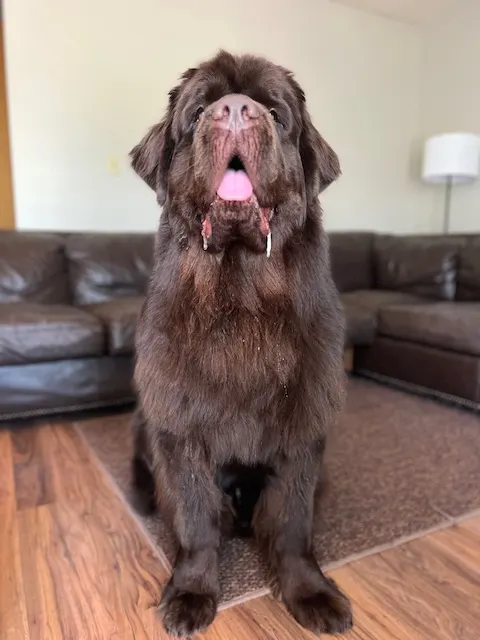When you read the description of the Newfoundland, specifically the head and neck part it reads, “The neck is strong and well set on the shoulders and is long enough for proud head carriage.”
A little bit further down it says, “The neck is muscular and blends into the well laid-back shoulder assembly. The neck of the male is more muscular and thicker than that of the female. A neck too short is generally an indication of poor shoulder placement and puts a Newfoundland out of balance.”
Basically, a Newfie has a big strong neck to carry around that beautiful big head and that’s a big job that comes with some pros and cons.
One of the big cons is some sort of neck injury which is often referred to as Newfie Neck by the Newfoundland community.
The first time I heard the term Newfie Neck was when Leroy hurt his neck and I had no idea what was going on.

I reached out to one of my mentors and they said that it sounded like Newfie Neck.
I had no idea that was a thing and when I went to look it up to get more information I came up with nothing.
That’s because it’s technically not a “real” medical condition.
What Is Newfie Neck?
In a nutshell, Newfie Neck is kind of like a slang term used in the Newfie community to describe various neck injuries that are common within the breed.
It’s not a specific medical condition that you’ll find listed online or in medical books.
It’s probably not even a term that your veterinarian knows so don’t go into the vet clinic and tell your vet that you think your dog has Newfie Neck because most likely they’ll look at you like you’re crazy.
However, vets that are used to treating giant breed dogs like the Newfie, might know the term and signs instantly.
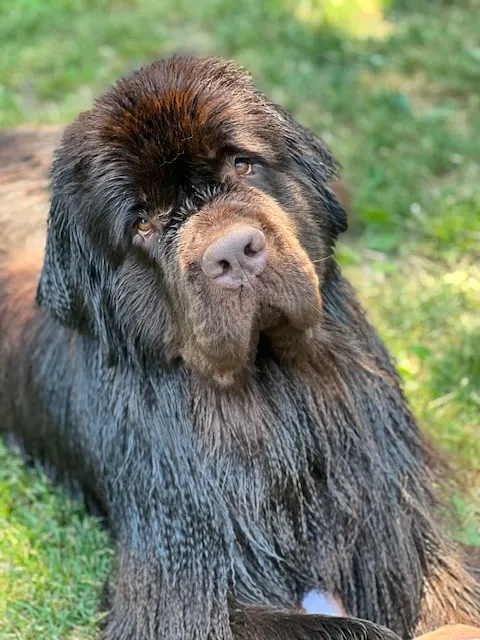
Our previous vet never heard of the term Newfie Neck but our current one has.
I can’t say that treatment would have been different if our first vet knew because while some vets might not be familiar with the term, they do know how to treat most neck injuries regardless of the breed.
Neck pain in Newfies can be a common symptom of various conditions such as:
Soft Tissue Injury
Soft tissue injuries in Newfies are probably the most common type of neck injuries especially in younger dogs.
Adolescent Newfies are maniacs and these types of injuries can be caused by trauma, such as pulling a cart, repetitive stress from activities like jumping, the crazy zoomies and slipping on floors.
Symptoms of a soft tissue neck injury often include pain, swelling and stiffness.
Treatment varies depending on the severity of the injury but may include rest, ice, physical therapy and pain medication.
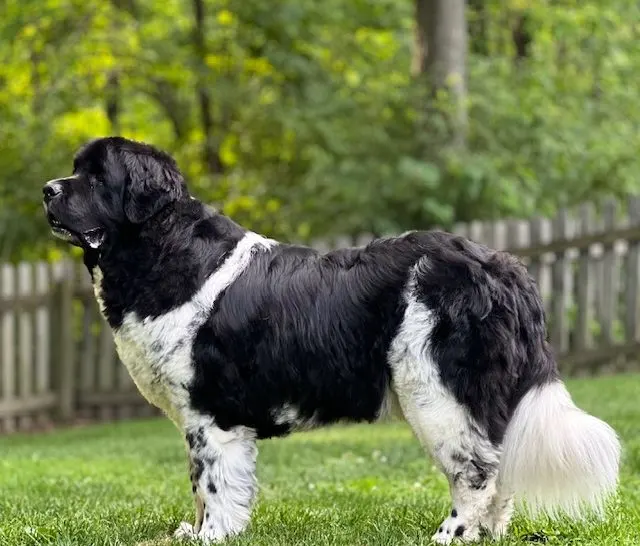
IVDD
Cervical IVDD is another common condition seen in the Newfoundland breed and it affects the cervical spine which results in neck pain.
This occurs when the intervertebral disc herniates into the spinal canal.
The disease can be caused by a number of factors, including age, genetics, and trauma.
IVDD can lead to pain and inflammation in the neck region, as well as weakness and paralysis.
IVDD is also referred to other neck issues such as:
- Bulging disc
- Slipped disc
- Herniated disc
- Ruptured disc
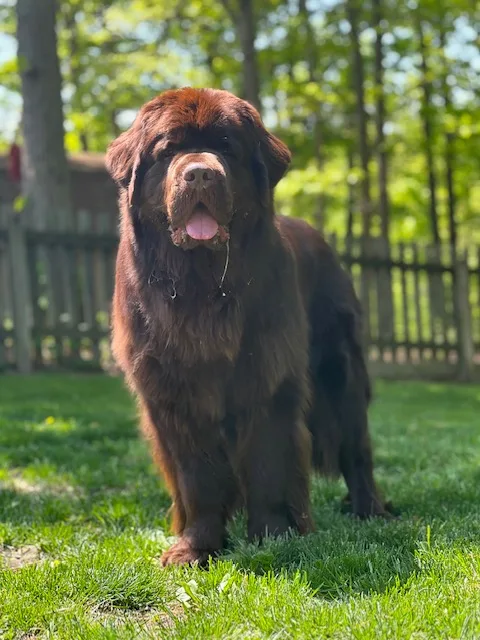
I believe that Leroy’s neck pain was caused by a slipped disc however we did not have an MRI performed to confirm the actual cause.
His flare-ups were usually settled down about 48 hours after the first dose of medication.
Your veterinarian can recommend the best course of treatment, which may include pain medication, and surgery in severe cases and physical therapy.
Inner Ear Infection
Another common condition seen with Newfies are ear infections but a specific type of inner ear infection (otitis media) can cause neck pain in dogs.
The underlying cause is unknown and symptoms are usually a reflection of the buildup of discharge in the middle ear.
Wobbler Syndrome
Wobbler syndrome is a common term to describe a gait seen in dogs with spinal cord compression in the neck.
Dogs that have this condition often take short steps with their front legs and then have a swaying or wobbly gait in the rear limbs.
(I was undecided if I should put this condition in here because I feel like it’s in a separate category so that’s the reason for the short mention)
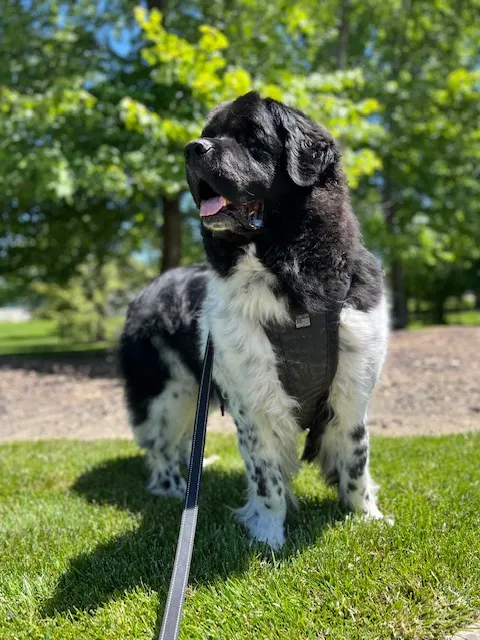
Common Signs Of Neck Pain In Dogs
It can be hard to pinpoint neck pain in Newfies because I think our minds always go toward other common medical problems seen in the breed.
I know when Leroy first had a flare-up I totally panicked because he was in SO much pain and he wasn’t a vocal dog but when he would go to get up, it would break my heart.
Common symptoms of neck pain in most dogs include:
- Reluctance to move the neck in any direction
- Pain or yelping when getting up
- Reluctance to eat and drink
- Head held down
- Arched back
- Putting more weight on the back legs
- Not walking straight
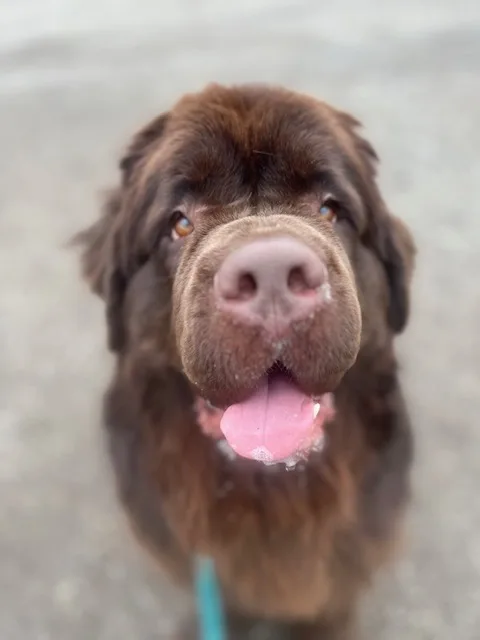
Leroy tended to always walk towards the left and wouldn’t turn to the right when he was having neck issues.
If your dog is showing any of these symptoms, it is important to see your veterinarian for a thorough examination.
The sooner your dog has a diagnosis, the sooner they start the road to recovery.
Treating Newfie Neck
The treatment for a Newfie with a neck injury will ultimately be based on the type and severity of the injury and your veterinarian.
This will look different for some dogs.
Since Leroy had IBD, we couldn’t use NSAIDS so he was on steroids and Tramadol.
We also got him a Help ‘Em Up Harness, did at-home laser therapy and used a heating pad per the advice from our veterinarian.
When I asked the Newfie Community on Facebook about Newfie Neck many people had said their dog was given Gabapentin and varying pain medications.
Many people also stated that taking their Newfie to a chiropractor or having acupuncture helped tremendously.
Newfies and most dogs, in general, can recover from cervical disc disease, but without timely treatment, it can progress quickly and cause irreversible spinal cord injury.
The sooner the issue is diagnosed, the better the prognosis.
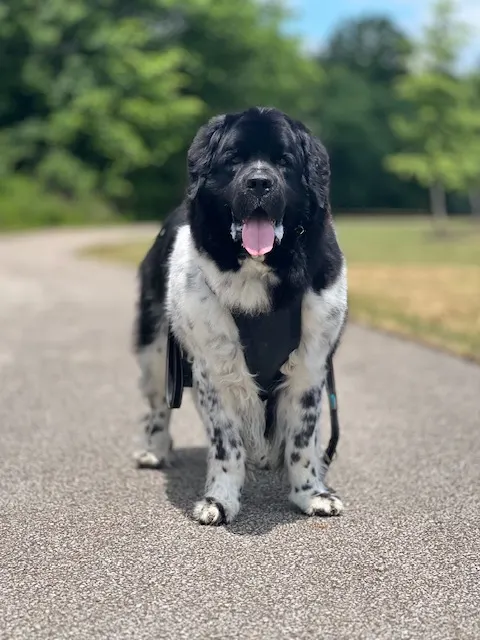
Tips On Preventing Neck Injuries
- Use a harness over a collar
- Keep your dog lean
- Use a ramp or steps so they’re not jumping out of the car
- Stop letting your Newfie use their head to open doors
- Don’t let them hang their head out of the car window
- Make sure your floors aren’t slippery
- Use an elevated bowl
- Discourage rough play
Take these tips with a grain of salt.
I know a lot of Newfie owners don’t like to use walking harnesses and to each their own.
I started using a harness because of Leroy’s neck issues. Odin always wears a harness and I alternate with Lou using a harness and a martingale collar.
Using elevated bowls is another personal preference but I think it’s a good option for senior Newfies with prior neck and joint issues.
I don’t know about you but all of my Newfies have learned that they can use their head to open most doors in our house and it drives me insane, especially when the door is latched and their head bounces off of it.
Another thing that Newfies are notorious for is using their nose or neck to poke at you or other dogs.
When you think about it, Newfies use their neck big heavy necks for so much so it’s no wonder why they are prone to issues.
So do me a favor.
One of these days watch your Newfie and see how much they use their neck and what things they’re currently doing that could lead to neck issues in the future.
I bet you’ll be surprised.
